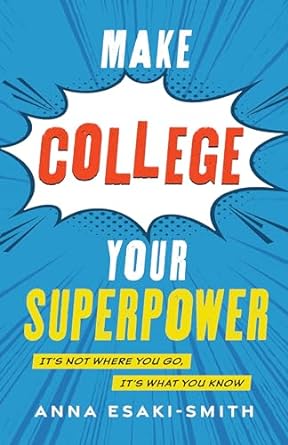This is a contributed piece from Anna Esaki-Smith, author of Make College Your Superpower: It’s Not Where You Go, It’s What You Know.

When my older son was applying to university, I went the whole nine yards to make sure he got every advantage. He was interested in New York University, so through my contacts as an education researcher, I clinched a meeting with then-NYU president John Sexton under the pretense that I was conducting a vague study about student recruitment. The world-famous legal scholar was warm and friendly, showing me the nest of a red-tailed hawk on the ledge of his office window, but I could see puzzlement in his eyes about why I was there.
As the polite but unfocused conversation ensued, even I wasn’t sure about what I wanted to accomplish. Why would the president of NYU—or any university—want to help a random student in their efforts to get in? Just say something about applying, I berated myself. Get an edge. But it wasn’t until I was out the door and heading down the hallway that I mustered the guts to turn around and say, “Hey, my son will be applying to NYU this fall!” Dr. Sexton was kind enough to nod in acknowledgement and wish us luck but, obviously, there was no golden ticket to be had.
I’m sharing this memory to convey my compassion for parents of high schoolers on the brink of applying to college. I know what it’s like when even the mere mention of the college application process makes your stomach sink and your chest tighten. You feel helpless. Getting your child into college seems as competitive as the Super Bowl, while you wield as much power as a sideline water boy.
Related: 3 Ways the College Admissions Process Can Be Improved
Knowledge and Skills Matter More than University Prestige
Perhaps there’s some consolation knowing that you’re not alone—the so-called “Operation Varsity Blues” scandal of 2019 made clear just how frenzied the sentiment had become, and the extent to which people would go to ensure their kids a coveted seat at a branded university.
But there is information out there to alleviate the stress, for both you and your child. For sure, getting into Ivy League schools like Harvard or Yale or those adjacent, such as Stanford or MIT, is harder than ever. If that is a goal within the reach of your high school student, congratulations and good luck!
But, for the remaining 95 percent of undergrad applicants, things are far from bleak! There’s no better time to be a student. That might sound counterintuitive, considering all that’s going on in the world today. But due to the tech-disrupted economy, employers increasingly value the knowledge and skills a university graduate brings to the table rather than the pedigree of their degree.
First off, statistics show that the average acceptance rate across all U.S. universities and colleges is a stunning 70 percent, and 37 schools accept everyone who applies. Selective schools may put students in a more niche student community, but students who know what they want from an education can find it anywhere.
4 Things to Remember When Choosing a College
In my book Make College Your Superpower: It’s Not Where You Go, It’s What You Know, I challenge the notion that earning a college degree from a prestigious university is the only sure path to success. I advocate for a more holistic approach to college admissions—one that considers individual strengths, interests, and goals.
So, as your child embarks on the college application journey, here are a four things to keep in mind:
1. The value of brand is diminishing.
Sure, there’s still rampant interest in the Ivy League and other top schools. But there’s an ongoing shift away from brand. Economic and technological changes have transformed the workforce, placing greater emphasis on skills and competencies over university prestige. What’s key in this age of ideas is to be innovative. So, give your child a break and lessen your emphasis on elite colleges when choosing a path for higher education.
2. There’s more data on which to base decisions.
Today, students can readily see the projected salaries for different majors and have a wider variety of ways to get an education. For example, the Georgetown University Center on Education and the Workforce ranks 4,500 colleges based on ROI, or the return on investment, and even offers that rating through the lens of low-income students. They examine the economic value of business, journalism and communications programs, too. So, students have a better idea of whether it’s worth paying top dollar for an expensive private university if what they might do when they graduate won’t do much to pay down their debt.
Related: I Don’t Want My Kids to Miss Out on High School Trying to Get Into College
3. In the age of tech, the humanities matter.
Certainly, eight out of the ten top-earning majors are in engineering. And considering the influence wielded by Microsoft, Apple and other big tech companies, many students feel that studying STEM and related subjects is the way to secure their future. But what they might not know is that in the age of artificial intelligence, human-centric qualities will be valued more than ever. Thinking creatively, being innovative, working collaboratively on a team—these skills and abilities are transferable from industry to industry and look good on any resume, even when a generation of tech becomes outdated. And there’s no better way to acquire those skills than by studying the humanities.
4. The future looks bright!
Ultimately, your goal should be to empower your high schooler to make informed decisions about their future. Help give them agency over the process, rather than let the process control them. Whether they choose to pursue a traditional four-year degree, vocational training, or an alternative pathway, encourage them to approach their education with confidence and purpose. While a university’s brand and global ranking are still a powerful draw, elite schools are no longer the sole gatekeepers to a graduate’s ability to succeed. There’s room for many at the top!
For more tips and resources on helping your teen through the college admissions process, check out Anna Esaki-Smith’s book Make College Your Superpower: It’s Not Where You Go, It’s What You Know.

Parenting teens is a tough job, but you’re not alone. Here are some posts other parents have found useful:
Over 100 of the Absolutely Best Gift Ideas for College Students
College Essays: A Great Opportunity for Students to Be Vulnerable
The Momancholy Is Real After You Drop Your Child Off at College
9 things to do in the teen years for a solid relationship with your grown son
*This post may contain affiliate links where we earn a small commission for purchases made from our site.






y175bp
Can you assist in how one applies for colleges outside of your home country?